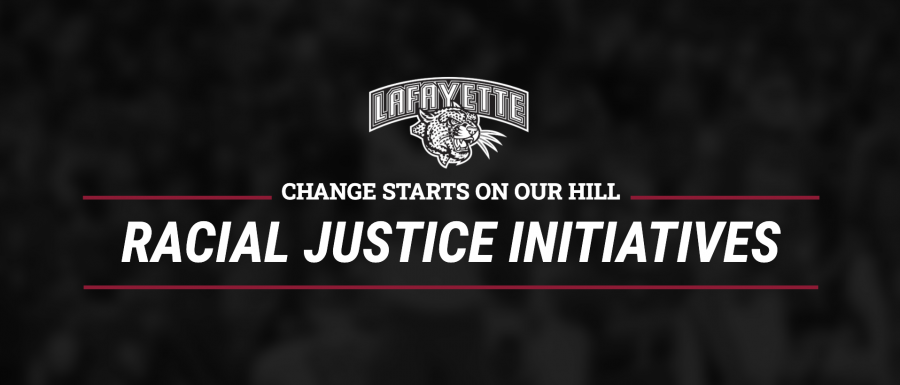The Lafayette athletic department has taken two crucial steps toward fostering a more inclusive and diverse environment for its student-athletes, after calls for racial justice amplified over the late spring and summer.
Earlier this year, Athletic Director Sherryta Freeman and women’s basketball head coach Kia Damon-Olson were named to the newly-formed Patriot League anti-racism committee. The athletic department later released a five-point plan to combat racism and ensure a positive experience for all the employees and students involved in athletics programs.
The department’s plan consists of five steps, beginning with education and ending with a pledge to “maintain race, diversity and inclusion resources to share with members of our community.” The steps of the department’s plan are: Education, representation, awareness, support and programming and resources and pledges.
While the plan to combat racism looks great on paper, much more will be needed to ensure a positive and inclusive environment for students and employees alike. Many allegations of racism and sexual violence were linked to athletic teams and players on the @anti.violence.laf and @black.at.laf Instagram accounts over the summer.
Freeman said that the department’s leadership team has been aware of the accounts, and they are focusing their efforts on education, conversations and dialogue and supporting student-athletes.
“How can we educate them in a way that is going to move the needle in the right direction?” Freeman said. “And how can we continue to improve the culture on our campus?”
One of the key points of the department’s plan is representation in both coaches and athletes. Freeman said that posting job openings within a more diverse group of organizations would be the main goal of the coach hiring process going forward.
“At the institutional level our main goal is to ensure that we have a fair process for posting positions and which casts a wider net for applicants,” Freeman said. “This will allow us to choose from a more diverse applicant pool which will lead to more diversity in the department.”
Having diverse representation on the hiring committee is also very important, according to Freeman.
“As we move forward with candidates, we will consider diversity every step of the way,” she said.
The Patriot League anti-racism commission is also scrutinizing the aspect of representation when hiring new coaches and administrators.
“The Patriot League anti-racism committee is having different conversations about what hiring practices will look like going forward,” Freeman said. “Conferences have added their versions of the Rooney Rule or Russell Rule and that’s a possibility for Lafayette.”
The Russell Rule was recently instituted in the West Coast Conference (WCC) and requires each member institution to include a member of a traditionally underrepresented community in the pool of final candidates for every athletic director, senior administrator, head coach and full-time assistant coach position in the athletic department. The Rooney Rule is a National Football League policy with the same requirement.
That being said, Freeman’s goal is more nuanced than a certain number of minority coaches or a hitting a diversity benchmark in the department.
“I’m not setting a target number in any way,” she said. “The department is looking at the process of hiring candidates and making sure we have equal representation throughout the process which we believe will lead to an increase in diversity.”
Joining Freeman on the Patriot League anti-racism commission is Damon-Olson, who said that the group is focused on how systemic racism affects different aspects of the athletics world.
“It’s very wide-ranging in terms of the things that [we’re] looking at, and also leveraging the voices of the student-athletes and not making the commission solely be about the older people, but really letting it be a place where the voices of the students are heard,” Damon-Olson said.
Lafayette’s plan to increase representation also goes beyond increased diversity in its staff, and states that it will “ensure student-athletes of diverse backgrounds are nominated and encouraged to apply for student leadership opportunities, awards, etc.”
“Some of the early thoughts I have on that relate to the intentionality of our coaches in their recruiting efforts,” Freeman said. “We must bring attention to our goal of increasing representation of diverse groups on our teams. This starts with our coaches thinking about where they are recruiting and planning on visiting areas of the country that may present a higher opportunity for diverse representation.”
“Once again, we are not necessarily focusing on numbers, rather we are focusing on adjusting the process,” she added. “How can we expand a coach’s reach with a level of intentionality of increasing diversity.”
Outside of increasing diversity through intentional hiring practices, some of the initiatives are as simple as having regular conversations on topics of racism, diversity and inclusion.
“The plan is about ensuring we have an inclusive environment and that we have a place where people feel like they belong,” Freeman said. “Our efforts for representation are important, but our efforts in supporting student-athletes when they are here is possibly more important and it’s something we want to focus on as well.”
Another key facet of the department’s plan is awareness, specifically around campus policies and procedures that are contradictory to diversity and inclusion. Freeman said the department has only had preliminarily conversations about the policies and procedures so far, and how they might change.
“We are getting feedback from our coaching staff on things they feel are challenges to how they would like to recruit, or different aspects of a student-athlete’s experience,” Freeman said. “I do not want to categorize [these policies or procedures] as systematic racism, rather they are something that impedes diversity…and we still have some additional work to do there.”























































































































